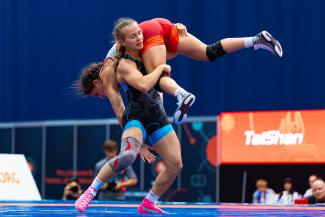Cuban Greco-Roman Great Mijain Lopez Wins Third Olympic Gold
Saturday, December 28, 2019 - 22:45 By Andrew Hipps

CORSIER-SUR-VEVEY, Switzerland (December 26) -- At the 2016 Rio Olympics, Cuban wrestling great Mijain LOPEZ captured his third Olympic gold medal in Greco-Roman wrestling, equaling the record of Alexander KARELIN (RUS, 1988-1996) and Carl WESTERGREN (SWE, 1920-1932). Lopez became the ninth wrestler in history to win three Olympic gold medals.
Lopez, a five-time world champion and eight-time world medalist, earned his Rio gold medal by shutting out Turkey’s reigning world champion Riza Kayaalp, 6-0.
After Kayaalp defeated Lopez at the 2015 World Championships in Las Vegas, many wrestling fans were expecting a hard-fought struggle in their Rio gold-medal match, but Lopez all but sealed his victory in the opening 30 seconds.
Lopez snapped Kayaalp down and wrapped up a tight chest-lock from in front and tossed the champ to his back for a quick 4-0 lead. He added a step-out point off an ensuring scramble to go up 5-0.
Lopez added another penalty point in the second period as things got chippy with a frustrated Kayaalp. He appeared to be closing in on a technical superiority with a minute remaining, but Lopez chose to ease home with the victory.
The 6-foot-5 Cuban celebrated his third Olympic gold title by doing a salsa-infused dance on the Mat. “The dance just came natural to me,” Lopez said moments after his match. “Brazil is Brazil, and in Brazil you have to dance!”


Share your thoughts.
Comments